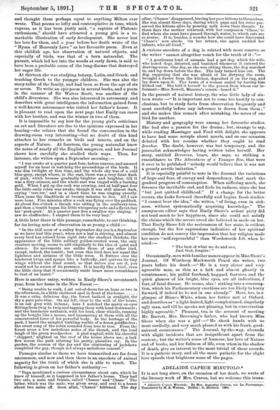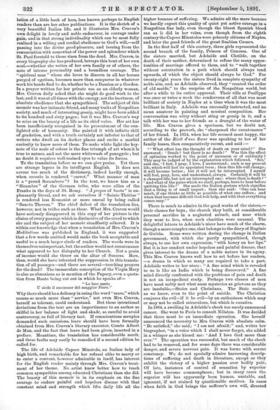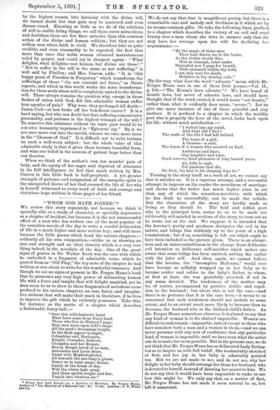ADELAIDE CAPECE MINITTOLO.*
IT is not long since, on the occasion of her death, we wrote of the literary work of Mrs. Craven, but we welcome this trans- • Adelaide G■peee Minatelo. By Mrs. Augustus Craven, nu La Ferrounays. Translated by M. B. Watson. Dublin : G. Herbert. 1890. lation of a little book of hers, less known perhaps to English readers than are her other.publications. It is the sketch of a very beautiful Italian life, and it illustrates Mrs. Craven's own delight in lovely and noble endeavour, in courage under pain, and in that strong individuality which can be most fully realised in a willing and cordial obedience to God's will,—self passing into the divine good-pleasure, and issuing from the renunciation with somewhat of the power and splendour which St. Paul foretold to those risen from the dead. Mrs. Craven, in every biography she has produced, betrays this bent of her own eoul,—whether she writes of her own family or of others, the note of intense personality and a boundless courage. The "spiritual man " whom she loves to discern in all her heroes purged of egotism, becomes more than conqueror in whatever work his hands find to do, whether he be a Damien or a Gordon. In a prayer written for her private use as an elderly woman, Mrs. Craven daily asked that she might do good work to the last, and it was at all times with the energy, not the inertness, of absolute obedience that she sympathised. The subject of this memoir was her intimate friend, and many traits of Neapolitan society, and much of interesting gossip, might have been added to its hundred and sixty pages ; but it was Mrs. Craven's way to seize on the beauty of a life as its chief value. Her art has been insufficiently recognised in its presentment of the sun- lighted side of humanity. She painted it with infinite skill of gradation, and with a truth certainly not inferior to that of writers who dwell on its darker places and excite a morbid .curiosity to know more of them. To make white light the key- note of the scale of colour is the fine triumph of art when it is true to nature, and not the mere whitewash of panegyric ; but no doubt it requires well-trained eyes to value its forces.
To the translation before us we can give praise. Yet there are strange lapses in its intelligent English. It does not savour too much of the dictionary, indeed hardly enough, when caroube is rendered " carrot." What manner of man is a " proud Scrambero " ? In the text, we know him as a Sicambre" of the German tribe, who were allies of the Franks in the days of St. Remy. "Apropos of boots " is un- pleasantly literal, and we ask ourselves if " Sainte Therese " is rendered less Romanist or more unreal by being called "Sancta Theresa." The chief defect of the translation lies, however, not in trifles such as these. What Mrs. Craven would have seriously disapproved in this copy of her picture is the elision of every passage which is distinctive of the creed to which she and the subject of her memoir steadfastly adhered. It is within our knowledge that when a translation of Mrs. Craven's Meditations was published in England, it was suggested that a few words omitted would make the book acceptable and useful to a much larger circle of readers. The words were in themselves unimportant, but the author would not countenance what appeared to her disloyalty to her Church. Not a grain of incense would she throw on the altar of Success. How, then, would she have tolerated the suppression in this transla- tion of all passages—and there are several—touching prayers for the dead ? The immaculate conception of the Virgin Mary is also as obnoxious as is mention of the Papacy, even a quota- tion from Dante being cut out in which he speaks of—
"Lo loco santo
II siede it successor del maggior Piero."
Why there should be a delicacy in using the word "mass," which means so much more than " service," not even Mrs. Craven, herself so tolerant, could understand. But these intentional deviations from the text are an impertinence to an author so skilful in her balance of light and shade, so careful to avoid controversy, so full of literary tact. If conscientious scruples demanded such omissions, leave should have been formally obtained from Mrs. Craven's literary executor, Comte Albert de Man, and the fact that leave had been given, inserted in a preface. Meantime, the translation has considerable merit, and these faults may easily be remedied if a second edition be called for.
The life of Adelaide Capece Minutolo, an Italian lady of high birth, and remarkable for her refusal alike to marry or to enter a convent, however admirable in itself, has interest for the English reader mainly through Mrs. Craven's treat- ment of her theme. No artist knew better how to teach common sympathies among educated Christians than she did. The beauty of this memoir is in its emphasis on the fine courage to endure painful and hopeless disease with that constant mind and strength which lifts daily life all the higher because of suffering. We admire all the more because we hardly expect this quality of quiet yet active courage in a Neapolitan fine lady, even though the bluest Spanish blood ran as ii did in her veins, even though from the eighth century the Capece Minutolos were princely citizens of Naples, and later the good friends of the great Suabian. Cresars.
In the first-half of this century, three girls represented the second branch of the family, Princes of Canossa. One of the sisters married, but Adelaide and Clotilde, on the death of their mother, determined to refuse the many oppor- tunities of marriage offered to them, and to " walk together without ostentation in a path which should always tend upwards, of which the object should always be God." For twenty-eight years the sisters lived in complete sympathy of noble aim, and, as Adelaide observed, they "created the order of old maids," to the surprise of the Neapolitan world, but after a while to its entire approval. Their villa at Posilippo was once or twice a week the rendezvous of all that was most brilliant of society in Naples at a time when it was the most brilliant in Italy. Adelaide was unusually instructed, and no
mean amateur in painting and musical composition. Her conversation was witty without sting or gossip in it, and a talk with her was to her friends as a draught of the water of life. Mrs. Craven gives a specimen, but we doubt not, according to the proverb, she "sharpened the countenance" of her friend. In 1854, when her life seemed most happy, the author of the Reeit d'une Sceur was speaking to her of her
family losses, then comparatively recent, and said :— '
" What effect has the thought of death on your mind ? ' She answered : Death ? but there is no death ? ' Was this the effect of optimism worked to the point of unreason or of sublimity ? This may be judged of by the explanation which followed. See,' said she, 4 I feel, I pray, I love, I understand : such is my present life, which will last its appointed term ; then this life will change ; it will become better ; but it will not be interrupted. I myself will feel, pray, love, and understand, always. Certainly it will be a changed life, but not an interrupted one : where then is death P ' And what of the pains which we shall, perhaps, have to bear before quitting this life ? ' She made the Italian gesture which signifies that a thing is of small import ; then she said One can bear much, if one thinks as little as possible of what one suffers; when that becomes difficult God will help, and with that everything comes comes easy.'"
There is much to admire in the good works of the sisters,— their classes for boys ; the church they built, at considerable personal sacrifice in a neglected suburb, and near which they went to live, when such charities were unusual. The delightful letters to Adelaide's niece have much of the charm,
though a more complex one, that belongs to the diary of Eugenie de Guerin. Some were written during. the change in Italian
government, with which she partly sympathised, though always, to use her own expression, "with honey on her lips."
But it is her conduct under hopeless and painful disease, that gives interest to the drama of a noble nature in its agony. This Mrs. Craven knows well how to set before her readers, —a drama in which so many are required to take a part.
Adelaide writes to her niece : " A fine mind which is revealed to us is like an India which is being discovered." A fine mind directly confronted with the problems of pain and death is not an inexpedient study. Perhaps two classes of men have most nobly met what seem mysteries as grievous as they are insoluble,—Stoics and Christians. The Stoic resists, as we know, even to the point of suicide. The Christian conjures the evil—if it be evil—by an enthusiasm which may or may not be called miraculous, but which is curative.
In 1864, a swelling in Adelaide's cheek too surely announced cancer. She went to Paris to consult Nelat,on. It was decided that there must be an immediate operation. She herself announced the necessity to Mrs. Craven with absolute calm. "Be satisfied," she said; " I am not afraid;" and, writes her biographer, "in a voice which I shall never forget, she added in a whisper as she kissed me : ' And I love God more than ever." The operation was successful, but much of the cheek had to be removed, and for some days there was considerable danger, and severe nervous pain. It was borne with serene constancy. We do not specially admire harrowing descrip- tions of suffering and death in literature, except as they exhibit the victory of a higher passion over bodily pair.
Of late, instances of control of sensation by superior will have become commonplaces ; but in Many cases the superior will has apparently been human, unstable, and ignorant, if not stained by questionable motives. In cases when faith in God brings the sufferer's own will, directed by the highest reason, into harmony with the divine will, we cannot doubt but that pain may be mastered, and even disease cured. Knowing so little as we do of the relations of will to visible living things, we call these cures miraculous, and doubtless there are few finer miracles than this common action of the divine and human volition ; but they are not seldom seen where faith is vivid. We therefore take as quite credible, and even reasonably to be expected, the fact that More than once this noble woman obtained instantaneous relief by prayer, and could cry in sharpest agony : " What delights, what delights—not human, bat divine are these ! " " Not to suffer in the will is the same as not suffering," is well said by Fenelon ; and Mrs. Craven adds: " It is this happy germ of Paradise in Purgatory' which transforms the sufferings of those " che son contenti nel fuoco," as Dante reports, and which in this world works the same transforma- tion for those souls whose will is completely united to the divine will. There always remains the question why, except in those flashes of union with God, did this admirable woman suffer true agonies of pain P Why were they prolonged till death- Janna Cceli—at last broke off her beneficent career P It is a hard saying, but who can doubt but that suffering concentrates personality, and patience is the highest triumph of the will P To conceive this existence without its tonic pain would be to conceive humanity imprisoned in "Epicurus' sty." By it we are once more run into the mould, whence we once more issue in the "likeness of God." It is difficult not to write truisms on such a well-worn subject ; but the whole value of this admirable study is that it gives these truisms beautiful form, and wins our belief in the sources of patient hope better than can theories.
When we think of the author's own ten months' pain of body, and the agony of her eager soul deprived of utterance in its full intelligence, we feel that much written by Mrs. Craven in this little book is half-prophetic. A yet greater strength of patience and resignation of the energetic spirit to the unexpected decree of her God crowned the life of her who in herself witnessed to every word of faith and courage and victorious hope written in these pages of her friend.




































 Previous page
Previous page